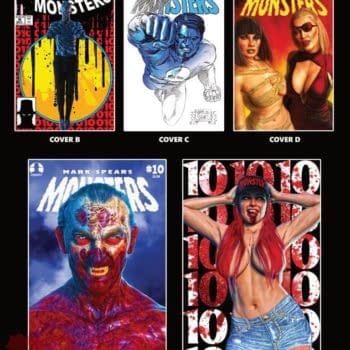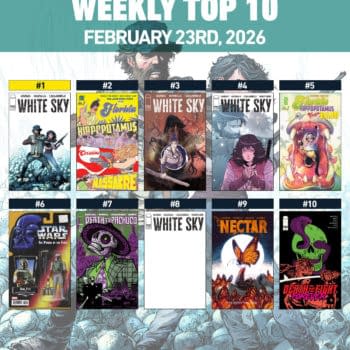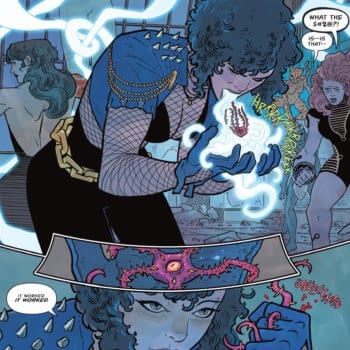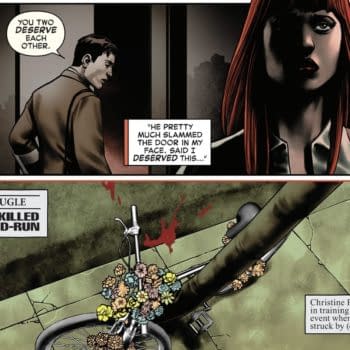Posted in: Look! It Moves! by Adi Tantimedh, Movies | Tagged: adi tantimedh, anime, entertainment, Inferno Cops, Killer Clothes, Little Witches, manga
Inferno Cops, Little Witches and Killer Clothes: The Rise of Studio Trigger – Look! It Moves! by Adi Tantimedh
Adi Tantimedh writes,
Animation studios in Japan are independent companies with their own distinct personalities and styles and story genres. Studio Ghibli is known worldwide for being Hayao Miyazaki's shop. Production I.G. has been a house for high quality Science Fiction and Fantasy series like Ghost in the Shell: Standalone Complex, Eden of the East and Moribito: Guardian of the Spirit. Madhouse is one of the most prolific studios with high-profile directors like the late Satoshi Kon and adapting top-selling series from Vampire Hunter D to Death Note to the upcoming One-Punch Man.
But the newest and most interesting studio on the block has been Studio Trigger.
One of the newest anime studios, formed only in 2011 by directors Hiroyuki Imaishi and Masahiro Otsuka. They had worked previously at Gainax doing key work on Neon Genesis Evangelion, FLCL and Tengan Toppa Gurran Lagaan. Studio Trigger's identity is defined by the punk rock crazy comedy found in FLCL and Gurran Lagaan, a go-for-broke sense of gleeful insanity informed by a strong awareness of genre deconstruction and theme. Unlike many other studios, they're also acutely aware of fandom and audiences in the West and think outside the box in what they want to produce.
[youtube]https://www.youtube.com/watch?v=gy0E-1MD0bw[/youtube]
Trigger's first production, Inferno Cop, was a seemingly low-fi piss-take and homage to over-the-top, ultraviolent 1990s Marvel and Image comics (and possibly Frank Miller as well) filtered through Japanese eyes. The "hero" is a cop with a flaming skull fighting crime in an ultraviolent city while also seeking revenge against the secret organisation that murdered his family. That's the merest excuse to take the piss out of all grime-n'-gritty American comics by making them utterly ridiculous. Its drawings are stiff and animation is deliberately limited and crude like those terrible old Marvel cartoons from the 1960s where they barely animated anything at all, done here to show up just how stupid and absurd it all is, but we love it for that. There's no point in my just summarising it. The entire series is available on Youtube, Crunchyroll and Hulu. Just watch the link.
[youtube]https://www.youtube.com/watch?v=nccrCOLXpy4[/youtube]
The studio's second production, an all-ages pilot called Little Witch Academia, is like a comedy, more slapstick female answer to Harry Potter. Its heroine is a fan of a cheerfully silly witch heroine who was an idol to millions of children but now considered by teens as passé and uncool to like. She ultimately finds strength in her love for that original cheesy childhood witch hero. The show illustrates what would be one of the main recurring themes in Trigger's shows: that it's okay to love the silly things you loved as a kid. The studio released the entire half-hour pilot on YouTube for all to see, and managed to fund a second instalment through Kickstarter, set for release later this year.
[youtube]https://www.youtube.com/watch?v=havZiN8gpM8[/youtube]
Kill La Kill is what's considered Studio Trigger's masterpiece so far. It's an R-rated continuation of the themes explored back in FLCL and Gurran Lagaan in its manic slapstick empowerment fantasy coupled with sexual awakening and adolescence, this time even more richly layered, openly indulging in and commenting on the leery sexual exploitation of gazing at naked bodies, the semiotics of clothing as a device for social control, S&M, high school elitism, Freudian symbolism and themes dialled off the charts, and even offering moments of Brechtian, Marxist commentary on Class Struggle and how the oppressed are kept down with bribes and entertainment as well as inside jokes about regional rivalry in Japan. Everything you need to know about the Japanese Male Gaze and sexism is in this show. It manages to have all its cakes and eat them too. You can now stream the show on Netflix, Hulu and Crunchyroll.
When Magical Battles Became Commonplace aka Inō-Batoru wa Nichijō-kei no Naka de would seem a quiet step back after the politicised lunacy of Kill La Kill, an adaptation of a light novel (Young Adult) series by Kota Nozomi. The story is about a group of high school students in a literature club who suddenly get superpowers, but Trigger subverts the expectations of the superhero genre here by depicting the students as just continuing to get on without lives without any interest in becoming superheroes. The show even deconstructs the harem genre by having all the female characters comment on where they tend to fit in the plot's hierarchy when they're all supposed to have a crush on the hero. The show also comments on fandom and geekdom in its hero's obsession with role-playing as an evil overlord while he has the most useless superpower in the whole group, and that comes to a head in an astonishing scene where his best friend from childhood (who also has superpowers) launches into a rant about how his geeky obsessions and behaviour have completely alienated her, as shown in the above video. When other superpowered people who are engaged in a life-or-death battle try to rope the cast into their conflict, the heroes use their powers to absolutely refuse to take part in that nonsense and just want to get on with school and their lives. You can stream the show now on Crunchyroll and Hulu.
[youtube]https://www.youtube.com/watch?v=_ltakZfA7I0[/youtube]
Ninja Slayer is a return to the cut-and-paste punk insanity of Inferno Cop. Vowing to avenge the death of his family, Ninja Slayer, possessed by the spirit of a ninja wants to slay all ninjas. As you do. Adapted from, apparently, a cult novel by Bradley Bond and Philip Ninj@ Morzez that was originally serialised on Twitter that spawned at least two manga series, Studio Trigger seems fully aware of the social media and meme-friendly aspects of the series and plays it to the hilt, revelling in the series' cheesy lines and gif-worthy ultraviolent slapstick visuals. Here's an even more seemingly cheap, gleeful piss-take of the macho Japanese pop thrillers. The animation even more limited and stilted than ever so you never forget how naff it all is as they aim for the heights of cheerful stupidity. Here is empowerment fantasy laid bare for all its cardboard simple-mindedness, yet with no less love for all things Pop and silly. The more over-the-top the story and characters and setpieces, the more unpolished animation takes it all apart. The series is now streaming on Funimation and Hulu.
The recurring theme that defines Studio Trigger is there's no shame in loving the silly comics, cartoons or other pop culture we grew up on, that they matter and resonate with us because they filled an emotional need in us. The studio is acutely aware of pop culture as a vehicle for delivering social and political messages through entertainment and proceeds to do that as they point that out. What's cool is dumb and what's dumb is cool, and Trigger embraces that duality with open arms. No other animation studio has put that drive to deconstruct the appeal of pop culture while being wildly entertaining as its identity and selling point. Pop culture is silly, says Studio Trigger, and that's why we love it.
Only good Triggers at lookitmoves@gmail.com
Follow the official LOOK! IT MOVES! twitter feed at http://twitter.com/lookitmoves for thoughts and snark on media and pop culture, stuff for future columns and stuff I may never spend a whole column writing about.
Look! It Moves! © Adisakdi Tantimedh








![White Sky #]1 second printing](https://mlpnk72yciwc.i.optimole.com/cqhiHLc.IIZS~2ef73/w:350/h:350/q:75/rt:fill/g:ce/https://bleedingcool.com/wp-content/uploads/2026/02/unnamed-2026-02-18T203050.994-350x350.jpg)









